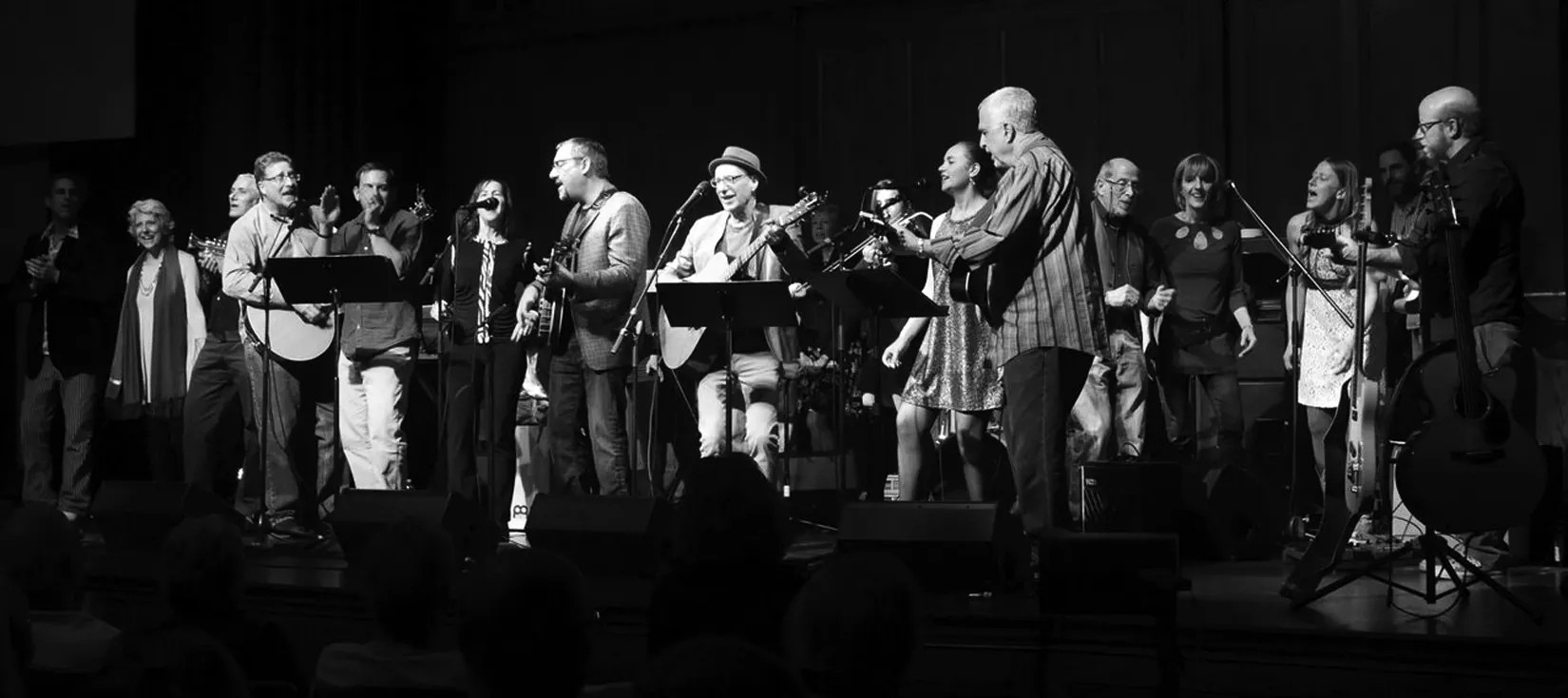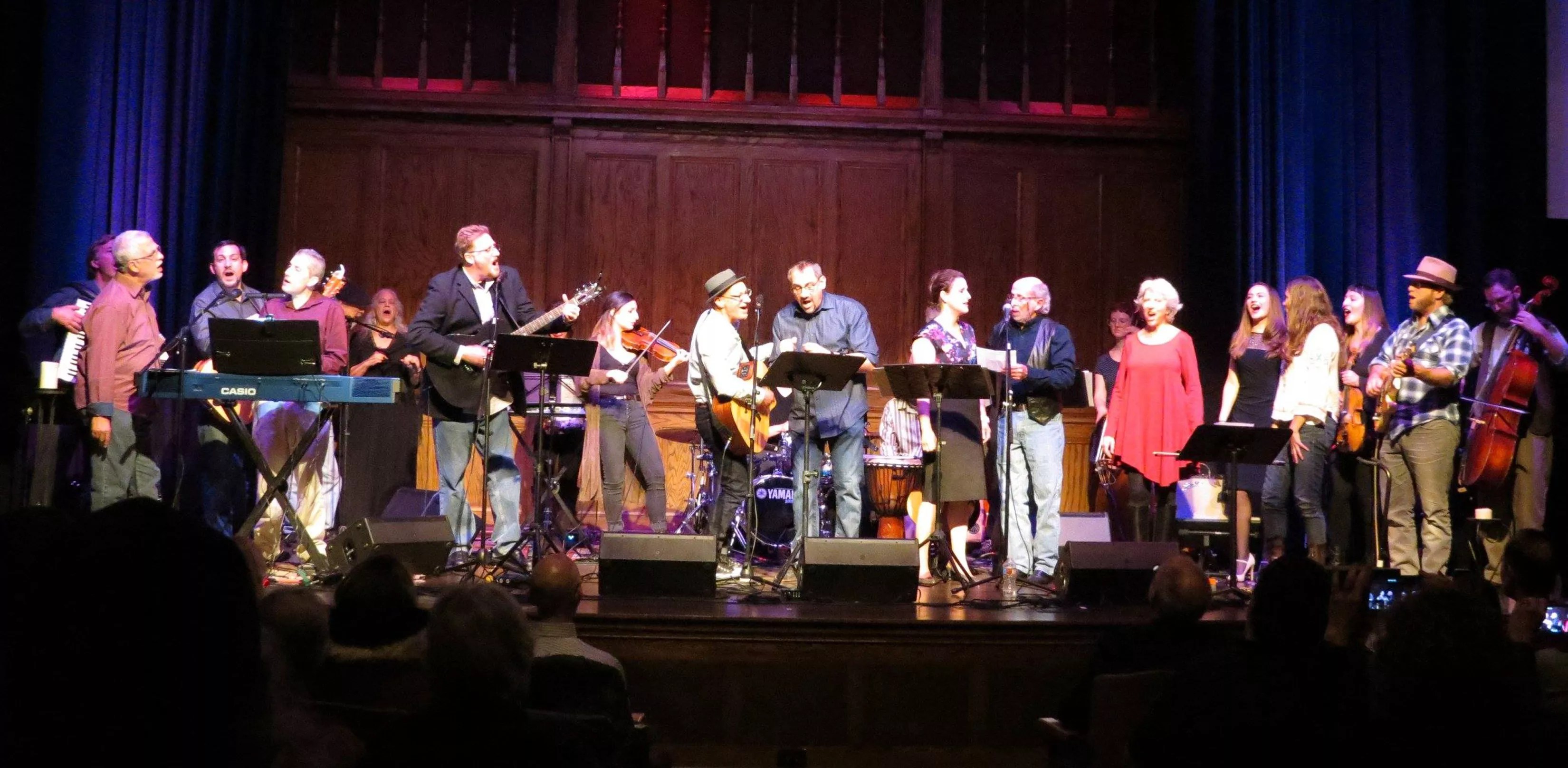
Hal Aqua

Audio By Carbonatix
Denver musician Hal Aqua is organizing a night of live music and fun dubbed “Jews Do Jews: Who Knew? Musicians You Didn’t Know Were Jewish.” The first edition of the annual event, held seven years ago, was an homage to Leonard Cohen; this year’s theme is much more expansive, incorporating songs from a broader swath of artists.
Ahead of the performance, Aqua spoke to Westword about forming connections through music with communities around town, what has changed since the show’s first performance, why it resonates with so many audiences, and what this year’s performance will look like.
Westword: What’s been the biggest change to the show since you started it?
Hal Aqua: It started off as kind of a one-off idea. I did it to do a tribute to Leonard Cohen; this was back in 2013, and he was still performing – in fact, kind of having a resurgence of fame, touring all over the world.
I’d always been a big fan. Obviously he was Jewish, and some Jewish themes crept into some of his songs, although certainly not all of them: biblical references, a song based on Yom Kippur, and liturgy. So there was always an undercurrent to that.
It occurred to me that I didn’t know of anyone that had put together a Jewish musicians’ tribute to Leonard Cohen. I floated it with Swallow Hill Music; they said, “Yeah, go for it.”
We gathered a whole bunch of musicians I knew who happened to be Jewish. Some of them in the Jewish music world, most of them old folkies and rockers that I knew from over the years.
We sold out. It was a really popular thing, and people said, “Let’s do this again.” So rather than a one-shot deal, I suggested [next year] we do Bob Dylan, who’s Jewish. So we did that; then we did Paul Simon.
The first three years were specific musicians that had some Jewish connections, and I consider those three to be my holy trinity. Those guys plus The Beatles were my rabbis, in a way, people that I learned from and gained inspiration from.
Then I thought, okay, let’s not repeat ourselves, and branch out a bit. So, we tried “Jews Do Jews,” and every musician got to pick a songwriter that happened to be Jewish. It was kind of a potpourri, and we covered people like Billy Joel, Andy Newman, Carole King, Lou Reed, Steve Goodman and Neil Diamond. All across the board.
It was mostly pop and rock, but we delved a little bit into Broadway, The Great American Songbook, George Gershwin, and that was fun. We did two years of that, and by that time, it had grown bigger. We had sold out Swallow Hill’s hall the first three years we did it, so we moved to L2 Church on Colfax that Swallow Hill was using for some venues. Last year we did a tribute to Jewish women songwriters and also had that at L2.
When we did the tribute to Leonard Cohen, I really had an overview of how to suss out the Jewish content of what Leonard Cohen wrote. We tried that with Dylan as well, somewhat with Paul Simon, but it was sort of an intellectual exercise that fell by the wayside.
It eventually got to be a fun thing where we said, ‘Let’s do musicians we really admire and people we’ve always wanted to cover, and the hook is: and they were Jewish.
It got to be a tongue-in-cheek approach that I think has sort of fully bloomed this year. This year, the idea is “Who Knew? Musicians You Didn’t Know Were Jewish.”
It has tenuous connections to Judaism and to Jewish culture. For example, I always wanted to do something by the Beatles; none of the Beatles were Jewish, so Linda Eastman, who became Linda McCartney back around the time the Beatles were splitting up, was Jewish.
Someone in our group noticed she’s actually credited co-writing a lot of the Wings songs with Paul McCartney, so that was our entry to being able to do a Paul McCartney song.
I think the whole premise of “Jews Do Jews,” which I think has gotten stronger over the years, is that anybody, any kind of ethnic group or minority or nationality or religion, has this kind of knee-jerk reaction about someone either good or bad, when you say, “Oh, were they Jewish?”
Bernie Madoff – bad for the Jews. Bad guy, happened to be Jewish. But then we’re ridiculously proud of Albert Einstein: “Of course he’s Jewish!”
It becomes this really kind of silly thing where we’re saying, “Oh, we’re one degree of separation from really famous people just because they happened to have some connection to Judaism.” It’s that tongue-in-cheek quality that I really want to play with this year.

Jews Do Jews filling a stage in 2016.
Hal Aqua
It sounds like a big part of doing these nights is about just having some fun.
Yeah. I always try to stress in our marketing that you don’t have to be Jewish. Obviously, we have a lot of Jewish people coming to it, but I very deliberately did not want it to be an insular thing held at the synagogue or Jewish Community Center.
Swallow Hill has been really behind this concept for all these years, and it’s really important to them and to us to just put it out there as one particular approach to world music that’s really for everybody.
I work in the Jewish Community Center as well as outside it. I feel like my goal was to get away from any insularity, any ‘”us” or “them”: This is who we are; this is who we’re not. I don’t like all the boundaries that surround the sort of traditional approach to anything. I like thinking of anything in terms of inclusivity.
In the same way that I’ve always been a fan of reggae music, African music – things that aren’t my particular culture, but I feel like I can appreciate the art and music that comes out of those cultures. I want to see Jewish music being positioned as something everyone can enjoy and appreciate and throw a party with.
To me, something like studying Talmud would be expressing Judaism the same way honoring the Beastie Boys would be, which we’re going to do this year.
What impact have you seen this annual event have in communities?
It certainly has gotten to be an event, at least within the Jewish community, hopefully for friends and people just interested in culture and music to get together and party once a year. It’s pretty lighthearted. It’s not a lecture. It’s not pedantic. We hope it’s not trying to make a point too heavy-handedly.
It’s kind of a way to celebrate a culture while, in a way, making fun of the exclusivity of that. It’s not really an exclusive thing. I would jump at the chance of going to an Ethiopian celebration of something. That’s not my world, but I love the world, love the music I’ve heard; it’s a chance to cross cultures, and I think the Jews Do Jews show has had an impact in that sort of way.
Have you had any pushback on the inclusivity?
No, I don’t think I have. It’s always surprised me that this thing seems to have more legs than I thought it would originally. I think part of that is I’ve sort of stepped around having to ask for permission to have it at synagogues or within the traditional Jewish community.
Being out there, a part of the scene, is more important, in my opinion.
How did this year’s idea of Who Knew? come together?
I didn’t want to repeat anything we’ve done before, and we’ve done this sort of general-purpose Jews Do Jews, pick-whoever-you-want sort of thing. I’m always afraid people are going to think, ‘I saw that last year,’ so I guess I’m always looking for a little edge to approach it differently.
It occurred to me that this tongue-in-cheek sort of approach has been an undercurrent since the beginning, but I’ve never really stated that outwardly. It’s like pulling back the curtains and realizing we’re really just goofing here. We’re really just goofing on what it means to be Jewish, and like I said, I think inclusivity is more important than insularity.
One thing I really like about Jewish culture is there isn’t any one right way to be Jewish. Some people might say there is, but I like to think of it as an overview culture that includes religion and philosophy and things like that. But it’s not the way anyone has to experience it.
What’s been the most rewarding part of watching something you created become an annual community event?
It’s been kind of humbling. I consider myself a bit of a jack-of-all-trades. My training is in graphic design. I do that as sort of my day job. But music’s always been really important to me, and it’s also become part of my career.
For many, many years, that was outside of any cultural reference. I played in rock bands, folk ensembles, reggae bands, and then about 25 years ago, discovered that in my own back yard there was really interesting and deeply exciting music in the Jewish world – traditionally, like all over the world.
I concentrated on being a musician in the Jewish world here in Denver. I have a klezmer band. I work for a couple of different synagogues as song leader. But that always felt like a separate part of my life from what I used to do musically and all the people I knew through Swallow Hill.
This thing has been the way to sort of put all that together. A lot of the musicians that came together the first year for the Leonard Cohen concert didn’t know each other. They were people I knew, and sort of connected with, and I think one of the most rewarding parts of this is, one of the reasons it kept going on besides there was an audience for it, was [that] a lot of musicians thought it was fun to get together to play music.
I had just a lucky break connecting some of my favorite musicians that hadn’t played together before. We’ve sort of built a little community of Jews Do Jews performers that we’re happy with and really proud of.
Jews Do Jews: Who Knew? Musicians You Didn’t Know Were Jewish, 7 p.m. Saturday, February 9, Central Presbyterian Church, 1660 Sherman Street.